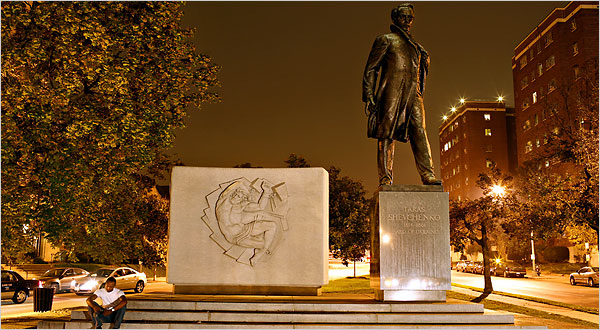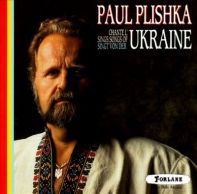Taras Shevchenko, 1848
Witnessing the dramatic events happening in Kiev this past week made me think of two of the original “freedom fighters” for Ukrainian nationalism: The country’s “national bard” Taras Shevchenko, as well as the Ukrainian composer who set his words to music, Mykola Lysenko.
I discovered Shevchenko quite by accident. There is a statue erected in his honor at the corner of 22nd and P Streets NW in Washington, D.C., just a few blocks away from the old NPR headquarters on M street, and across the street from the legendary DC beer joint The Brickskeller, (“featuring beers from Argentina to Zimbabwe”) the preferred postgame pizza-and-beer location for the NPR softball team. And at about the same time, we received an over-the-transom submission to Performance Today of a concert devoted to works by Ukrainian (!) composers – quite a novelty in the late ’80s. (As was, by the way, the idea of offering scores of imported beers on tap…).
But 1988 was a Millennium Year for Ukraine, marking the 1000th anniversary of the adoption of Christianity in the forerunner state of Kievan Rus.’ Sure enough, the recording featured an abundance of works by both Dmitry Bortniansky (1751-1825) and Lysenko (1842-1912), with many of the latter’s pieces featuring texts by Shevchenko. Turns out the Lysenko set more than 80 of his fellow Ukrainian’s works to music. One of the most famous was “The Days Pass By,” long a staple in the repertoire of Ukrainian-American bass Paul Plishka (whom I think sang it on the program but can’t be sure.)
Both Shevchenko and later, Lysenko were imprisoned in their fight for Ukrainian independence – and it’s hard not to read the lyrics as sort of Shevchenko’s version of MLK’s “Letter from the Birmingham Jail.” Others interpret the words as Shevchenko’s scorn for the laziness of his compatriots, “in which somnolent inactivity is seen as far worse than death in chains,” according to the Encylopedia of Ukraine. Regardless, it’s a powerful mixture of music and text, and easy to understand why it’s still a part of Ukrainian culture to this day:
The days pass by, the nights pass by As does summer. Yellowed leaves Rustle, eyes grow dim, Thoughts fall asleep, the heart sleeps, All has gone to rest, and I don’t know Whether I’m alive or will live, Or whether I’m rushing like this through the world, For I’m no longer weeping or laughing My fate, fate, where are you now? I have none; If you begrudge me a good one, Lord, Then give me a bad one! Let a walking man not sleep, To die in spirit And knock about the entire world Like a rotten stump. But let me live, with my heart live And love people. And if not then curse And burn the world! It’s horrible to end up in chains To die in captivity, But it’s worse to be free And to sleep, and sleep, and sleep And to fall asleep forever, And to leave no trace At all, as if it were all the same Whether you had lived or died! Fate, where are you, fate where are you? I have none! If you begrudge me a good one, Lord, Then give me a bad one! A bad one!
Sadly, I couldn’t find any recordings by Plishka of that song to share via YouTube, but I remember to decipher enough Cyrillic to find this ancient recording by the Ukrainian baritone Mikhail Grishko, one of the great voices of the Stalin era, and almost completely unknown in the West.
Back to the composer, Mykola Lysenko. Seems I’m not the only one whose curiosity has been stirred about the story of this early Ukrainian nationalist of late. Here’s an excerpt from a recent syndicated Washington Post called “9 Questions about Ukraine You Were Too Embarrassed To Ask:”
5. This is getting complicated. Can we take a music break?
Great idea. Ukraine has a rich tradition of folk and popular music, including one of their many classical greats, Mykola Lysenko. A Ukrainian nationalist, and by his death in 1912 a major star, Lysenko loved to incorporate Ukrainian folk melodies into his compositions – for example, his simple but beautiful Second Ukrainian Rhapsody for piano.
Lysenko’s life, more than a century ago, charted many of the same issues driving today’s crisis. Ukraine was then a part of Imperial Russia, which pushed composers and musicians to use only the Russian language. Lysenko refused, composing two operas in Ukrainian, which he refused to translate into Russian, even though this meant they could never be performed in Moscow. Because an 1876 Tsarist decree banned the use of Ukrainian in print, Lysenko had to have his scores printed in secret abroad. He died a hero to Ukrainians, his music cherished by contemporaries like Pyotr Tchaikovsky, but recordings are criminally difficult to find today.
Then there’s the Feb. 21 edition of Classicallite: “Ukrainian Unrest, or what the late Nationalist Composer Mykola Lysenko would do to President Putin.”
Mykola Vitaliyovych Lysenko, the late Ukrainian composer, pianist and scholar, was lauded for his nationalism. He refused to write his operas in Russian, which were eventually banned by the czars in 1876. Not too surprisingly, modern day Russia seems vaguely similar to imperial Russia, what with both admins trying to buttress the motherland like a rabid dog cornering a small child (who speaks half-Russian, half-Ukrainian, I might add).
Alas, recordings of Lysenko’s compositions–like the identity of that masked pianist–are criminally difficult to procure. And as the flames of revolution further engulf a war-torn nation, his work will likely become more difficult to find. Regardless, he died a hero to Ukrainians everywhere, cherished by his sympathetic contemporary Pyotr Ilyich Tchaikovsky. And as Lysenko’s land turns to charred rubble today, I know that he would still be a vocal proponent of Ukrainian independence.
Then there’s the unofficial Ukrainian National Anthem: “A Prayer for Ukraine,” composed by….you guessed it:
Oh Lord, Almighty and Only
for us our Ukraine, please, keep
by freedom’s and the rays of light
you set her in light.
Oh, and by the by, the story of getting the Schevchenko statue erected in Washington is another fascinating tale of Cold War intrigue, richly detailed in an article in Ukrainian Week:
The dramatic campaign to build the Shevchenko monument continued for five years. “Two superpowers, American and Soviet, were pitted against each other,” wrote Antin Drahan in his book Shevchenko in Washington. The Soviet embassy twice appealed to the U.S. Department of State demanding plans for the monument be scrapped. It was joined by the puppet representation of the Ukrainian SSR in the UN.Hostile anti-Ukrainian forces rallied around The Washington Post. The newspaper painstakingly portrayed Shevchenko as a hater of Catholics, Orthodox, Russians, Poles, and Jews and, at the same time, as a harbinger of communism. Reputed as a respectable and liberal periodical, it pressed the Congress to repeal the resolution it had passed. Tensions mounted after the site was dedicated when Secretary of the Interior Stewart Udall decided, influenced by an anti-Ukrainian article in The Washington Post, to revise the already decided question. However, these attempts eventually failed.






You must be logged in to post a comment.